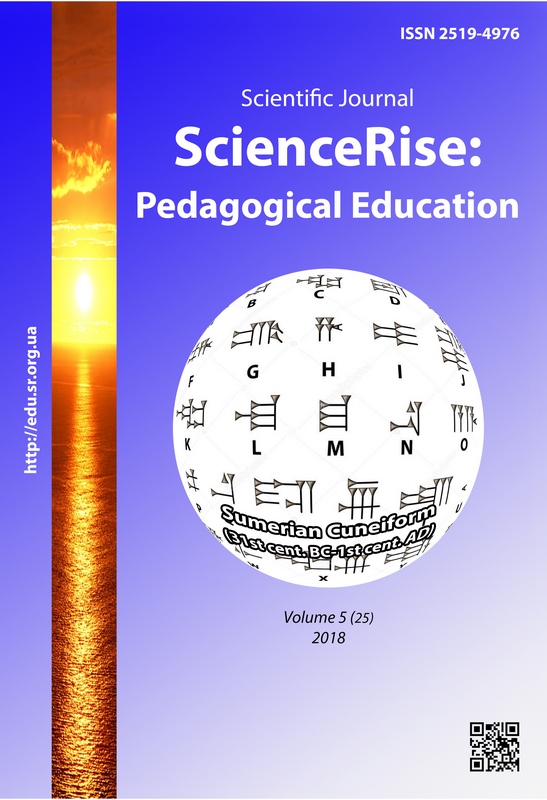Standardization of vocational education on the basis of competency approach
DOI:
https://doi.org/10.15587/2519-4984.2018.137845Keywords:
vocational education, competency approach, standardization of vocational education, junior specialistAbstract
The article summarizes some aspects of the competence approach in vocational education, substantiates the definition of "standardization of vocational education"; The content, stages and results of standardization of vocational education are defined. There are four interrelated, successive stages of achieving the appropriate levels of quality of training specialists.
The theoretical search found that if the standardization of vocational education should be considered not only as "the procedure for the development and approval of the standard", but also as an officially established procedure for the implementation of its provisions and adhere to the requirements for the competent training of graduates at the stages of goal-setting, selection and structuring of the content of education, mastering students, students competencies, assessing competency achievements of students, students and graduates (in particular, independent), then there is a possibility to substantially increase the quality of the functioning of vocational education, in particular, professional advance.
An experimental study was conducted to find out the actual state of training of junior college and technical colleges in the agrarian, construction and engineering sectors. The study found that 61.3% of teachers regularly use educational qualifications, a training program for a junior specialist in the development of educational documents; 23,3% only when preparing a working curriculum; 9.1% - use these documents extremely rarely; 6.3% of teachers of colleges and colleges do not use at all.
The study of the level of readiness for the standardization of vocational education demonstrated the following tendency: the high level of readiness for standardization of education on a competent basis was only 10.8% in agrarian educational institutions, 17.5% in machine-building and 48% in colleges and technical schools in the construction industry.
It is concluded that the current state of training of junior specialists in the agrarian, construction and engineering sectors is characterized by a system of organizational destructive factors that determine the urgent need to develop a set of measures to rationalize the standardization of education
References
- Vitvytska, S. S. (Ed.) (2015). Innovatsiini pedahohichni tekhnolohii u systemi neperervnoi profesiinoi osvity. Zhytomyr: Polissia, 368.
- Kremen, V. H., Sukhomlynska, O. V., Bekh, I. D., Ohneviuk, V. O., Tkachenko, V. M., Saukh, P. Yu. et. al. (2013). Rozvytok suchasnoi osvity: osvitolohichni naholosy. Osvitolohiia – naukovyi napriam intehrovanoho piznannia osvity. Kyiv: Yurinkom Inter, 162.
- Zgurovskiy, M. (2006). Diplomovana psevdoosvita, abo superechnosti perehidnogo periodu u sferi vischoyi osviti Ukrayini. Available at: https://dt.ua/EDUCATION/diplomovana_psevdoosvita,_abo_superechnosti_perehidnogo_periodu_u_sferi_vischoyi_osviti_ukrayini.html
- Tokmylenko, T. T. (2014). Vyshcha osvita i Bolonskyi protses. Kharkiv: KhNADU, 120.
- Zimnyaya, I. A. (2013). Kompetentsiya i kompetentnost' v kontekste kompetentnostnogo podkhoda v obrazovanii. Inostrannye yazyki v shkole, 6, 2–11.
- Lugoviy, V. I., Talanova, Zh. V. (2017). Osoblivosti standartizatsiyi profesiynoyi nevischoyi i vischoyi osviti: teoretiko-metodologichniy aspekt // Pedagogika i psihologiya. Visnik NAPN Ukrayini, 1 (94), 5–20.
- Radkevich, V. O.; Radkevich, V. O. (Ed.) (2012). Kompetentnisniy pidhid do zabezpechennya yakosti profesiynoyi osviti i navchannya. Naukovo-metodichne zabezpechennya profesiynoyi osviti i navchannya. Kyiv: IPTO NAPN Ukrayini, 5–12.
- Yahupov, V. V. (2011). Metodolohichni osnovy rozuminnia ta obgruntuvannia poniat “kompetentnist” i “kompetentsiia” shchodo profesiinoi pidhotovky maibutnikh fakhivtsiv. Available at: http://lib.iitta.gov.ua/10635/1/Метод_основи_розумння.pdf
- Korotkova, L. I., Luk’yanova, L. B., Luk’yanenko, G. I. et. al. (2011). Profesiyni standarti: teoriya i praktika rozroblennya. Kyiv: Pedagogichna dumka, 220.
- Nichkalo, N. G. (Ed.) (2002). Derzhavni standarti profesiynoyi osviti: teoriya i metodika. Khmelnitskiy: TUP, 334.
Downloads
Published
How to Cite
Issue
Section
License
Copyright (c) 2018 Petr Luzan, Tetyana Paschenko, Natalia Vanina, Nadiia Kolisnyk

This work is licensed under a Creative Commons Attribution 4.0 International License.
Our journal abides by the Creative Commons CC BY copyright rights and permissions for open access journals.
Authors, who are published in this journal, agree to the following conditions:
1. The authors reserve the right to authorship of the work and pass the first publication right of this work to the journal under the terms of a Creative Commons CC BY, which allows others to freely distribute the published research with the obligatory reference to the authors of the original work and the first publication of the work in this journal.
2. The authors have the right to conclude separate supplement agreements that relate to non-exclusive work distribution in the form in which it has been published by the journal (for example, to upload the work to the online storage of the journal or publish it as part of a monograph), provided that the reference to the first publication of the work in this journal is included.








